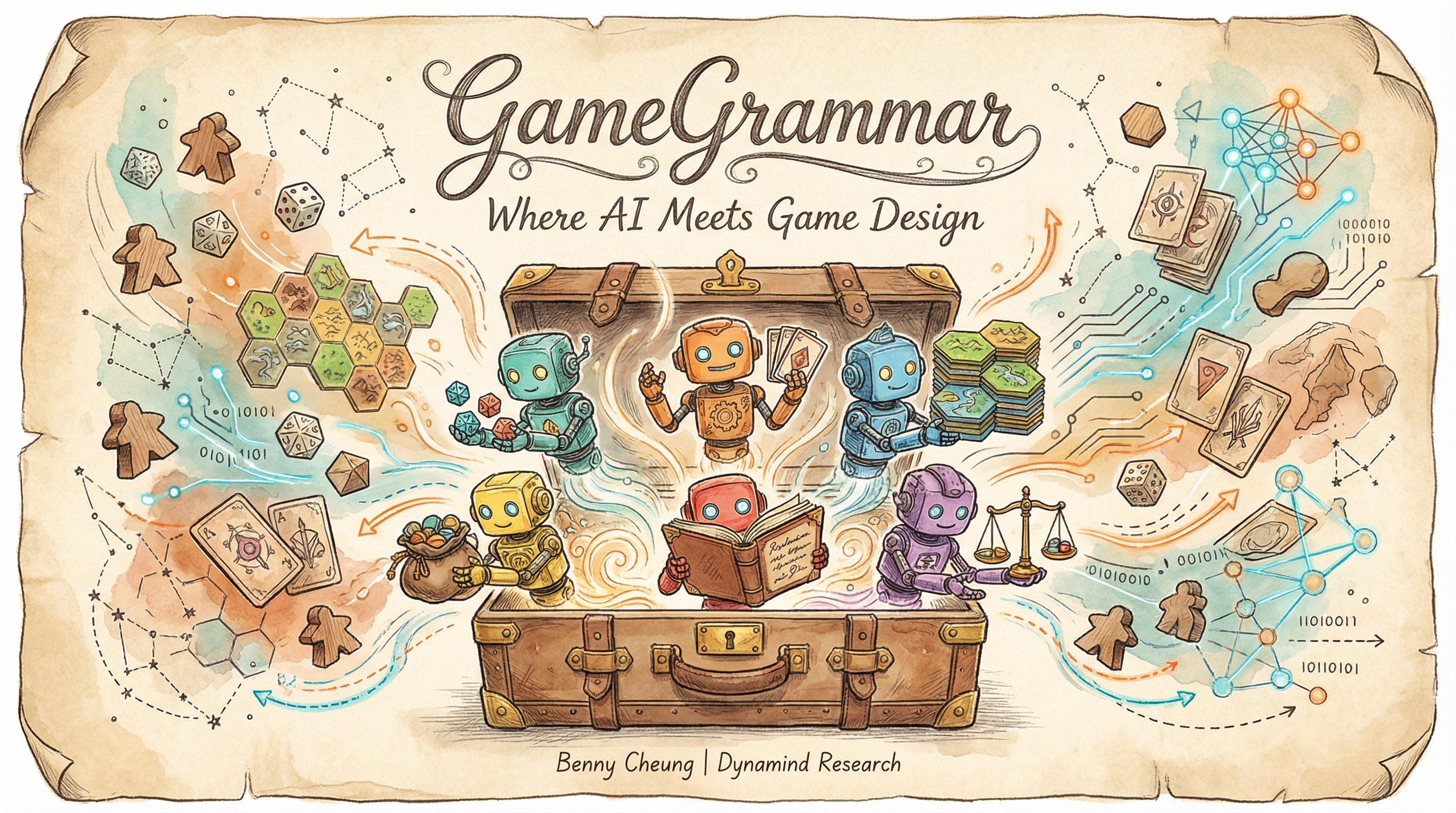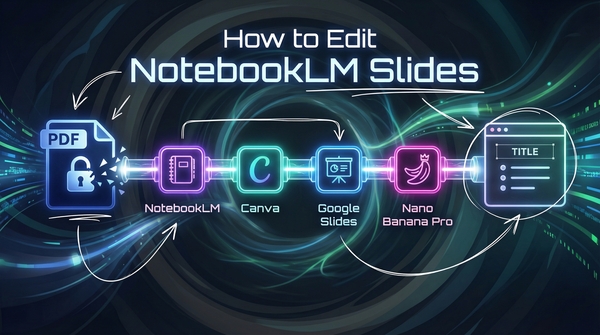artwork by DALLE-3
The Intelligence Age and How to Thrive in It
Philosophy of AI
Part 3 of 6Human existential crisis occurs when someone deeply questions the meaning, purpose, or value of their life. It often leads to feelings of anxiety, uncertainty, or confusion about one’s direction and role in the world. Throughout history, humans have faced existential questions in various forms. Whether it was cavemen pondering their place in the natural world or us navigating the complexities of the Intelligence Age, grappling with meaning and purpose seems to be a timeless part of the human experience.
Benjamin Bratton’s recent post, “The Five Stages of AI Grief,” and Avital Balwit’s “My Last Five Years to Work” both explore deep existential questions. It appears that the Intelligence Age is heightening these concerns. How can we address this growing issue?
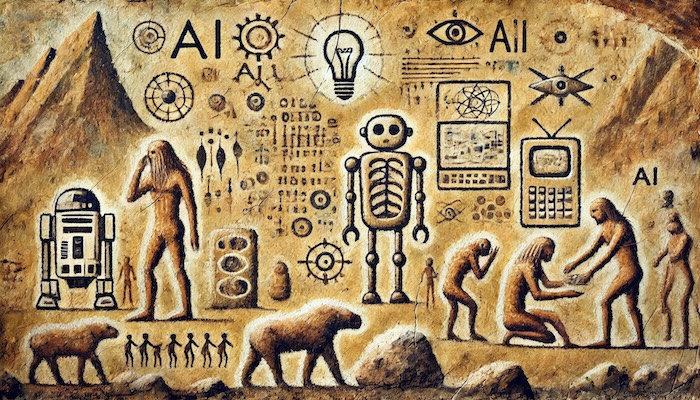
Figure. Cavemen’s existential crisis in the Intelligence Age - Just as we are confronting our own existential questions about AI’s role in society today, this artwork suggests that the challenges of adapting to new technologies are timeless.
We can address these concerns by focusing on what makes us uniquely human. Encouraging education that emphasizes empathy, creativity, and critical thinking can help. Open conversations about the impact of AI can also ease anxieties. By promoting lifelong learning and adaptability, we empower people to find purpose and stay engaged in a rapidly changing world.
We can listen to this article as a Podcast Discussion, which is generated by Google’s Experimental NotebookLM. The AI hosts are both funny and insightful.
images/intelligence-age-how-to-thrive/Podcast_Human_Perceptive_Efficiency.mp3
The Intelligence Age and How to Thrive in It
This is the dawn of The Intelligence Age, as envisioned by the AI visionary, marks a transformative epoch where AI becomes an integral part of our daily lives. Intelligence is no longer a scarce resource but a ubiquitous commodity, reshaping how we access information, make decisions, and interact with the world. Central to thriving in this new era is the enhancement of Human Perceptive Efficiency & Cognitive Efficacy - our ability to perceive, process, and apply information effectively. This article explores strategies for personal excellence and the pivotal role of education in amplifying human potentiality, ensuring we not only adapt to but also possibility of leading in the Intelligence Age.
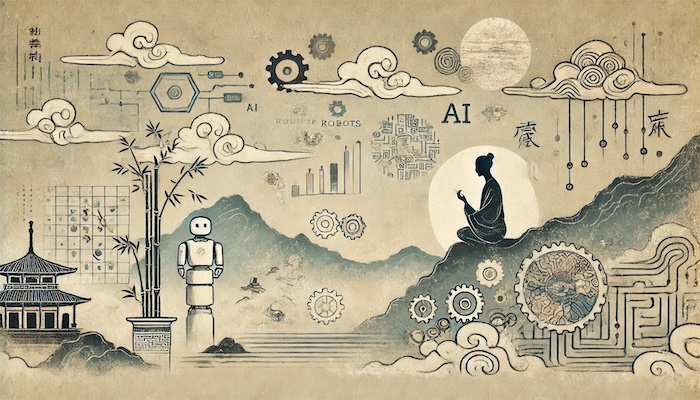
Figure. The serene figure in meditation reflects the pursuit of cognitive clarity and balance, while the robotic and mechanical elements represent the growing role of AI in augmenting human cognition and decision-making.
Human Improvement
One way to thrive in the Intelligence Age is by improving our unique human ability which involves enhancing how we perceive, process, and use information. With AI managing routine tasks, we have an opportunity to focus on deeper understanding, creativity, and higher-level problem-solving.
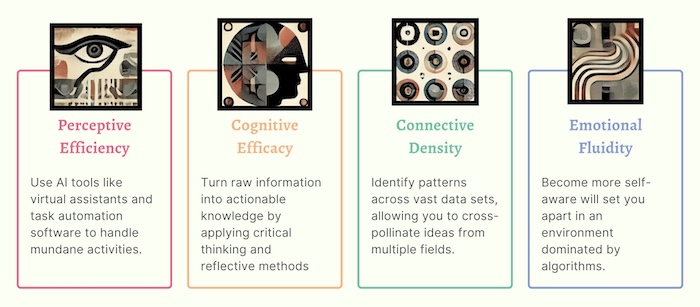
Figure. Key Human Traits for Thriving in the Intelligence Age
Perceptive Efficiency - Maximizing output while minimizing cognitive effort through effective collaboration with AI.
First, offload repetitive tasks to AI. Instead of spending hours sorting emails or scheduling appointments, use AI tools like virtual assistants and task automation software to handle mundane activities. This frees up valuable time for us to tackle more complex and strategic issues that truly matter.
Cognitive Efficacy - Developing profound understanding and expertise in specific domains.
Second, dive deeper into subjects that interest us by using AI to curate, process, and organize large amounts of information. Engage with learning platforms or research tools that can tailor content to our learning pace. However, it’s crucial to turn this raw information into actionable knowledge by applying critical thinking and reflective methods like the Socratic approach—continuously questioning, discussing, and analyzing ideas to challenge assumptions and enhance understanding.
Connective Density - Expanding cognitive abilities across multiple domains and perspectives.
Third, broaden our horizons by connecting different disciplines. AI excels at identifying patterns across vast data sets, allowing us to cross-pollinate ideas from multiple fields. For instance, tools like data visualization software or AI-based research platforms can help us uncover links between areas like psychology, technology, and business, leading to innovative solutions. This interdisciplinary mindset often sparks creativity and can push us toward more groundbreaking discoveries.
Emotional Fluidity - Investing into emotional intelligence in maintaining ethical and empathetic decision-making in an AI-driven world.
However, thriving in the Intelligence Age isn’t solely about leveraging technology. Emotional intelligence becomes even more vital. While machines can analyze data, they cannot understand human emotions, empathy, or complex social dynamics. Investing in emotional intelligence by practicing empathy, improving communication skills, and becoming more self-aware will set us apart in an environment dominated by algorithms. Participating in active listening exercises, reflecting on our interpersonal interactions, and seeking feedback can enhance these skills, making us a more effective collaborator and leader.
Ethical considerations also play a significant role as we integrate AI into more aspects of life. This isn’t just about minimizing harm but about actively making thoughtful, ethical decisions that positively impact society. As we use AI tools, consider their societal implications—such as privacy, fairness, and accountability. Engage in discussions on AI ethics, advocate for responsible technology use, and align our actions with broader social values to ensure AI is harnessed as a force for good.
The Importance of Continuous Learning
Continuous learning is essential too. The pace of change isn’t slowing down, and the skills that are valuable today might not be tomorrow. Stay curious. Use AI tools to learn new things, whether that’s a language, a programming skill, or understanding a new field. Lifelong learning isn’t just a buzzword; it’s a necessity.
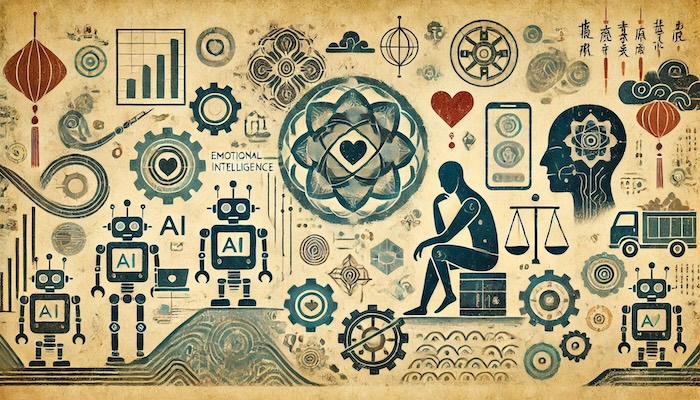
Figure. We must embrace AI not just for efficiency, but for personal growth, learning new skills, and fostering emotional intelligence, ensuring that humanity thrives alongside intelligent machines.
So what can we do right now? Start integrating AI tools into our daily routine. There are plenty of apps and platforms designed to help with everything from project management to personal education. Set specific goals for what we want to learn or accomplish, and let AI assist us in getting there. Let’s explore some practical actions that we can take immediately.
Practical Actions
The practical actions are more than just keeping up with technology; it’s about enhancing our uniquely human abilities and using AI as a tool to amplify them. By taking these practical steps, we position ourselves not only to adapt to the changes but to lead and inspire others in this new era.
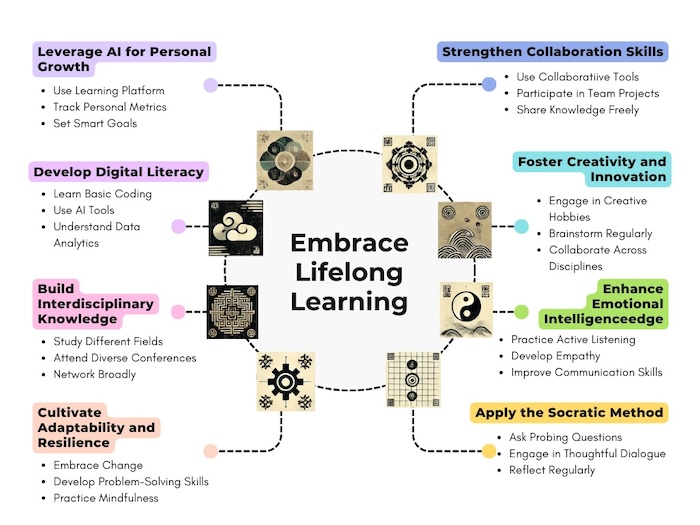
Figure. There are practical actions that we can engage in the continuous learning in the intelligence age.
AI tools have become indispensable in this journey of continuous learning. They aren’t just for automating tasks or crunching numbers; they’re powerful allies in personal growth. Whether we’re trying to learn a new language, master a programming skill, or dive into an entirely new field, AI can tailor the learning experience to our needs. It’s like having a personal tutor who knows exactly where we struggle and how to help us overcome those challenges. This personalized approach makes learning more efficient and less daunting.
Embracing lifelong learning starts with curiosity. It’s about maintaining a mindset that values growth over comfort. When we stay curious, we’re more likely to explore new areas, ask questions, and seek out opportunities to expand our knowledge. This curiosity drives us to use AI tools effectively, setting specific goals and allowing technology to assist us in achieving them. It’s not enough to recognize the importance of learning; we have to actively integrate it into our daily routine.
Developing digital literacy is another key component. In an age where technology permeates every aspect of our lives, understanding how to use it effectively is crucial. Learning basic coding, familiarizing ourselves with AI-powered applications, and understanding data analytics can significantly enhance our productivity and innovation. Digital literacy isn’t just about knowing how to use tools; it’s about leveraging them to solve problems and create value in ways that weren’t possible before.
Interdisciplinary knowledge fosters innovative thinking. When we draw from multiple fields, we can approach problems from different angles, leading to groundbreaking ideas. This doesn’t mean we have to become an expert in everything, but having a broad understanding allows us to connect the dots in ways others might miss. Attending diverse conferences, networking with professionals from various backgrounds, and studying different disciplines can spark creativity and lead to unique solutions.
Adaptability and resilience are essential traits in the Intelligence Age. The ability to navigate rapidly changing landscapes effectively sets us apart. Embracing change as an opportunity rather than a threat allows us to stay ahead. Developing problem-solving skills and practicing mindfulness can help us handle uncertainty with confidence. When we’re adaptable, we’re better equipped to pivot when necessary and seize new opportunities as they arise.
Collaboration skills are increasingly important in a world where teamwork drives success. Using collaborative tools like Slack or Trello can streamline our workflow and make working with others more efficient. Participating in team projects and sharing knowledge freely not only enhances our own skills but also builds a network of support and innovation. In an environment where ideas are constantly evolving, being able to work well with others is invaluable.
Creativity and innovation are the engines that drive progress. Engaging in creative hobbies, brainstorming regularly, and collaborating across disciplines can stimulate our creative thinking. AI can assist by providing new perspectives and generating ideas that we might not have considered on our own. By fostering creativity, we set ourselves up to develop unique solutions that can differentiate us in any industry.
Emotional intelligence is another area where continuous learning pays dividends. Strengthening interpersonal relationships and improving teamwork are aspects that AI can’t replicate. Practicing active listening, developing empathy, and enhancing our communication skills can make us a more effective leader and collaborator. Emotional intelligence helps us navigate the complexities of human interactions, which are crucial for personal and professional success.
Finally, applying the Socratic method can deepen our critical thinking and lead to better decision-making. Asking probing questions, engaging in thoughtful dialogue, and reflecting regularly on our beliefs can help us understand complex issues more thoroughly. This method encourages us to challenge assumptions and explore ideas in depth, fostering a more nuanced and informed perspective.
Embracing Educational Transformation in the Intelligence Age
Education systems need to evolve as well. Traditional models focused on memorization won’t cut it anymore. We need to emphasize critical thinking, creativity, and adaptability. Schools should incorporate AI literacy into their curricula so that students understand how to work alongside technology effectively.
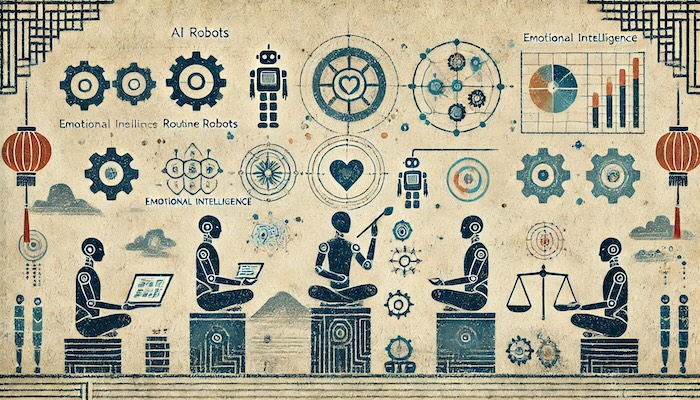
_Figure. This depiction of AI robots and gears symbolizes the integration of technology into learning and professional environments. The human-like figures emphasize the importance of combining emotional intelligence, critical thinking, and adaptability with AI literacy. _
In industries like healthcare, finance, and IT (see Zheyuan Cui, et al. in the Reference section), AI is already making significant impacts. Professionals in these fields need to understand how AI can enhance their work. It’s not about machines replacing humans, but about improving what we can achieve together. We can use this practical advice to influence our friends and children.
One highly respected educator, Ethan Mollick, offers great guidance in his book, Co-Intelligence - Living and Working with AI. His blog posts on utilizing AI as an educational assistant are also invaluable. We should develop practical advice that goes beyond personal gain to reimagine education, focusing on skills that complement AI capabilities. This approach will prepare students not just to survive, but to thrive and innovate in the Intelligence Age.
Practical Advice for Evolving Education Systems
To navigate this shift, educators, policymakers, and stakeholders must take deliberate steps to evolve education systems. Here are practical ways to embrace these necessary changes.
Enhancing access to technology is foundational. Ensuring that all students have the necessary technological tools and resources is crucial for equitable education. This means not only providing devices like laptops and tablets but also ensuring reliable internet access and training students to use these tools effectively. Addressing the digital divide prevents further socioeconomic disparities and ensures that every student can engage with modern learning platforms. Equal access to technology is fundamental to creating an inclusive education system where all students have the opportunity to succeed.
Once access is ensured, integrating AI and technology education becomes essential. Introducing AI literacy programs that cover basic concepts, applications, and ethical considerations helps students become active participants in technological development rather than passive consumers. Teaching coding and data analysis skills from an early age equips students with the tools they need to navigate a data-driven world. These skills are foundational, allowing students to engage with technology in meaningful ways, regardless of their future career paths.
Revising curricula to emphasize core competencies builds on this foundation. It’s no longer sufficient to focus solely on rote memorization or standardized testing. Developing critical thinking, problem-solving, creativity, and emotional intelligence prepares students for the complexities of today’s world. Integrating interdisciplinary learning helps students see how different fields intersect, fostering a more holistic understanding of problems and solutions. When students can draw connections between subjects, they become better equipped to innovate and adapt.
Adopting innovative teaching methods can transform the learning experience. Project-based learning encourages the practical application of knowledge, making education more relevant and engaging. When students work on real-world projects, they see the immediate impact of their efforts, which enhances motivation and retention. Incorporating collaborative assignments mimics real-world problem-solving, where teamwork and communication are key. These methods prepare students for the collaborative nature of modern workplaces, where diverse teams work together to tackle complex challenges.
Investing in teacher training and development is crucial for the success of any educational reform. Teachers need to become proficient with new technologies and teaching strategies to effectively guide their students. Professional development programs should focus on equipping educators with the skills they need to facilitate learning rather than just deliver information. When teachers are confident and competent in using new tools, they can create more dynamic and interactive learning environments. This investment ensures that educators are prepared to lead their students through the evolving educational landscape.
Strengthening industry-education partnerships keeps curricula aligned with current technological advancements. Collaborating with industries ensures that what students learn is relevant and applicable in the real world. Offering internships, mentorships, and practical experiences bridges the gap between classroom learning and real-world applications. These partnerships provide students with valuable insights into their chosen fields and help them build networks that can support their careers. By staying connected with industry trends, education systems can remain responsive and forward-thinking.
Promoting ethical understanding and responsibility is increasingly important in a technology-driven world. Teaching students about the ethical implications of AI and technology use prepares them to make responsible decisions. Encouraging discussions on privacy, bias, and the societal impact of technological decisions fosters a sense of accountability. Ethical education ensures that future innovators consider the broader consequences of their work, promoting a more just and equitable society. As technology becomes more integrated into our lives, understanding its ethical dimensions is essential for responsible citizenship.
Finally, Fostering lifelong learning mindsets ensures that education doesn’t end with formal schooling. Encouraging a culture where continuous learning is valued and supported helps individuals stay relevant in their careers and personal lives. Providing resources for ongoing education and skill development beyond the classroom allows people to adapt to changing circumstances and seize new opportunities as they arise. Lifelong learning is about maintaining curiosity and a commitment to growth throughout one’s life, ensuring that individuals can navigate the ever-evolving landscape of the Intelligence Age.
These practical steps ensure that education remains a powerful tool for personal growth and societal progress, preparing individuals to thrive in a world where continuous learning and adaptability are paramount.
Conclusion
The Intelligence Age is changing not just how we access and use knowledge, but also how we perceive and interact with the world. By adopting personal strategies and educational reforms, we can thrive alongside AI. Enhancing our efficiency, depth, diversity, and emotional intelligence on an individual level supports a broader shift toward an education system that empowers everyone to excel. When personal growth meets progressive education, we unlock new opportunities for innovation and understanding. The choices we make today in embracing these strategies will shape human progress, ensuring a future where our potential is amplified and progress knows no bounds.
Following this advice helps us address the existential questions that come with rapid technological advancements. As AI grows, many people may feel uncertain about their roles or purposes. By fostering critical thinking, emotional intelligence, and continuous learning, we reaffirm what makes us uniquely human. Proactively integrating AI with a forward-thinking approach to education creates a future where humans aren’t overshadowed by technology but work together with it to reach new heights.
By embracing these strategies and promoting collaboration across all sectors, we can lead in the Intelligence Age. This ensures that humanity not only coexists with AI but thrives alongside it. The imperative is clear: act with foresight, inclusivity, and a commitment to excellence to enhance our capabilities in this transformative era. In doing so, we can resolve the deeper existential uncertainties we face and build a future where both humans and AI contribute to boundless progress.
References
-
Sam Altman, The Intelligence Age, Blog, 23 Sep 2024.
-
Ethan Mollick, Co-Intelligence - Living and Working with AI, Portfolio (April 2 2024), ISBN 9780593716717
- Ethan Mollick, Co-Intelligence: AI in the Classroom with Ethan Mollick, video, 16 Apr 2024.
- Co-Intelligence: AI in the Classroom with Ethan Mollick (Professor, Wharton School of the University of Pennsylvania) on StageX.
- Ethan Mollick, Lilach Mollick, Assigning AI: Even Approaches for Students with Prompts, Wharton School of University of Pennsylvania & Wharton Interactive, 24 Sep 2023.
- The authors propose seven approaches for utilizing AI in classrooms: AI-tutor, AI-coach, AI-mentor, AI-teammate, AI-tool, AI-simulator, and AI-student, each with distinct pedagogical benefits and risks.
-
Benjamin Bratton, The Five Stages Of AI Grief, Noema Blog, 20 Jun 2024.
-
Avital Balwit, My Last Five Years of Work, Palladium Blog, 17 May 2024.
- Cui, Zheyuan and Demirer, Mert and Jaffe, Sonia and Musolff, Leon and Peng, Sida and Salz, Tobias, The Effects of Generative AI on High Skilled Work: Evidence from Three Field Experiments with Software Developers, SSRN, 03 Sep, 2024.
Notes
- This is an interesting take on the human existential crisis caused by AI. My critique on I Will Fucking Piledrive You If You Mention AI Again will try to balance it out.
- The true essence of AI extends beyond mere commercial success. While some individuals might not gain recognition or financial reward immediately, their efforts signify a deeper commitment. AI isn’t just a business endeavor; it represents a dream, a culture, and a significant aspect of human destiny. Despite facing criticism and historical periods of disillusionment (known as AI winters), dedicated individuals continue to invest in AI due to its profound philosophical and intrinsic values.


